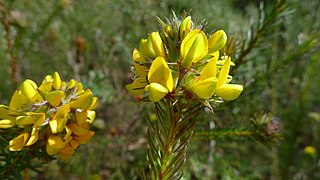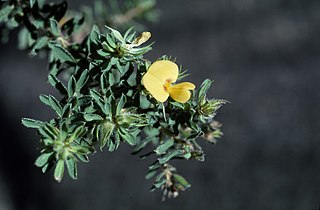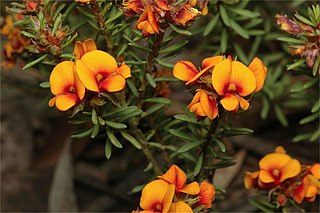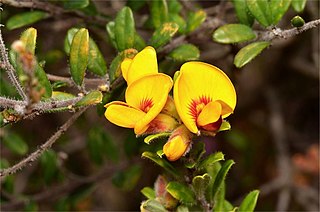
Pultenaea gunnii, commonly known as golden bush-pea, is a species of flowering plant in the family Fabaceae and is endemic to south-eastern Australia. It is a slender, erect to spreading shrub with hairy young stems, egg-shaped to lance-shaped leaves with lance-shaped stipules at the base, and bright yellow and dark red flowers.

Pultenaea stipularis, commonly known as handsome bush-pea, is a species of flowering plant in the family Fabaceae and is endemic to New South Wales. It is an erect shrub with glabrous stems, linear to narrow elliptic leaves, and yellow to orange flowers, sometimes with red markings.

Pultenaea villosa, commonly known as hairy bush-pea, is a species of flowering plant in the family Fabaceae and is endemic to eastern Australia. It is a shrub with softly-hairy foliage, narrow elliptic to linear, oblong to club-shaped leaves, and yellow-orange and reddish-brown, pea-like flowers.

Pultenaea echinula, commonly known as curved bush-pea, is a species of flowering plant in the family Fabaceae and is endemic to a small area of New South Wales. It is an erect shrub with linear, needle-shaped, grooved leaves, and dense clusters of yellow to orange and red flowers.

Pultenaea graveolens, commonly known as scented bush-pea, is a species of flowering plant in the family Fabaceae and is endemic to Victoria, Australia. It is a strongly scented shrub with hairy stems, egg-shaped leaves with boat-shaped stipules at the base, and flowers that are mostly yellow.
Pultenaea lapidosa is a species of flowering plant in the family Fabaceae and is endemic to south-eastern Australia. It is an erect to low-lying shrub with linear to narrow elliptic leaves and deep orange and dark red flowers.

Pultenaea luehmannii, commonly known as thready bush-pea, is a species of flowering plant in the family Fabaceae and is endemic to the Grampians National Park. It is a diffuse, more or less prostrate sub-shrub with trailing branches, narrow elliptic leaves, and orange and dark brown flowers.
Pultenaea maidenii, commonly known as Maiden's bush-pea, is an extinct species of flowering plant in the family Fabaceae and was endemic to Victoria, Australia. It was an erect shrub with egg-shaped leaves with the narrower end towards the base, and pea-shaped flowers.

Pultenaea penna, commonly known as feather bush-pea, is a species of flowering plant in the family Fabaceae and is endemic to south-eastern continental Australia. It is a rigid, spreading shrub with linear, needle-shaped leaves and yellow and red, pea-like flowers.

Pultenaea platyphylla, commonly known as flat-leaf bush-pea, is a species of flowering plant in the family Fabaceae and is endemic to south-eastern continental Australia. It is an erect, rigidly-branched shrub with narrow egg-shaped to wedge-shaped leaves with the narrower end towards the base, and yellow to orange and red to purple flowers.

Pultenaea polifolia, commonly known as dusky bush-pea, is a species of flowering plant in the family Fabaceae and is endemic to south-eastern continental Australia. It is an erect to prostrate shrub with linear or elliptic to egg-shaped leaves with the narrower end towards the base, and yellow to orange and red to purple flowers.

Pultenaea reflexifolia, commonly known as wombat bush-pea, is a species of flowering plant in the family Fabaceae and is endemic to isolated parts of Victoria. It is an erect shrub with its foliage covered with tangled hairs, and has elliptic to narrow egg-shaped leaves with the narrower end towards the base, and yellow and red pea-like flowers arranged singly or in pairs on the ends of short side branches.

Pultenaea rostrata is a species of flowering plant in the family Fabaceae and is endemic to eastern Australia. It is an erect shrub with elliptic to linear, oblong to club-shaped leaves and yellow to orange and reddish-brown, pea-like flowers.

Pultenaea subspicata, commonly known as low bush-pea, is a species of flowering plant in the family Fabaceae and is endemic to south-eastern continental Australia. It is a low-lying, prostrate or mat-forming shrub with elliptic leaves and yellow to pink and orange-red, pea-like flowers.

Pultenaea tarik is a species of flowering plant in the family Fabaceae and is endemic to the Gibraltar Range National Park in New South Wales. It is an erect shrub with hairy, arching branchlets, elliptic to egg-shaped leaves with the narrower end towards the base, and yellow to orange and red to purple, pea-like flowers.
Pultenaea tenella, commonly known as delicate bush-pea, is a species of flowering plant in the family Fabaceae and is endemic to the high country near the border between New South Wales and Victoria in south-eastern continental Australia. It is a small, prostrate, mat-forming shrub with elliptic to linear leaves and yellow to orange and red, pea-like flowers.
Pultenaea trichophylla, commonly known as tufted bush-pea, is a species of flowering plant in the family Fabaceae and is endemic to South Australia. It is a slender, prostrate to erect shrub with hairy branchlets, lance-shaped leaves, and yellow to orange and red, pea-like flowers.
Pultenaea villifera is a species of flowering plant in the family Fabaceae and is endemic to two disjunct areas of Australia. It is an erect to prostrate shrub with triangular to linear, egg-shaped to elliptic leaves and yellow and red, pea-like flowers.

Pultenaea viscidula, commonly known as dark bush-pea, is a species of flowering plant in the family Fabaceae and is endemic to South Australia. It is an erect shrub with branches that are sticky when young, linear to cylindrical, channelled leaves with stipules at the base, and yellow to orange and yellow-red to green flowers.

Pultenaea vrolandii, commonly known as cupped bush-pea, is a species of flowering plant in the family Fabaceae and is endemic to south-eastern continental Australia. It is an erect shrub with hairy, arching branchlets, elliptic to egg-shaped leaves, and yellow to orange and red to brown flowers.
















